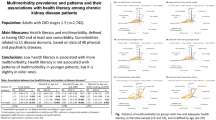Abstract
Background
Low health literacy (HL) has been associated with poor chronic disease management and adverse outcomes. However, reports on HL in predialysis chronic kidney disease (CKD) patients are limited in Japan.
Methods
From August 2019 to February 2020, the European Health Literacy Survey (Japanese version) and a patient background survey (highest level of education, income, social activities, and exercise habit) were conducted on adult predialysis CKD patients. We compared clinical parameters in two groups according to the average HL score of a healthy Japanese population. In addition, a median value of 42 items was used as a cutoff for extracting CKD patient background factors associated with HL since HLS-EU-Q47 included five items related to physical activity and exercise.
Results
Valid responses were received from 200 patients. Median general HL index was 25.2 points. The high-HL group (≥ 25.3 points) showed a low proportion of male (56.7% vs. 70.9%, p = 0.038), high social activities (69.1% vs. 48.5%, p = 0.003), and high exercise habit (36.1% vs. 13.6%, p < 0.001). In the multivariate analysis, social activity [OR (95% CI); 2.12 (1.16–3.89), p = 0.015] and exercise habit [OR (95% CI); 2.39 (1.16–4.90), p = 0.018] were extracted as the only significant variable.
Conclusions
HL in Japanese predialysis CKD patients was associated with high social activity and exercise habit.


Similar content being viewed by others
References
Imai E, Horio M, Watanabe T, Iseki K, Yamagata K, Hara S, Ura N, Kiyohara Y, Moriyama T, Ando Y, Fujimoto S, Konta T, Yokoyama H, Makino H, Hishida A, Matsuo S. Prevalence of chronic kidney disease in the Japanese general population. Clin Exp Nephrol. 2009;13(6):621–30.
Yamagata K, Ishida K, Sairenchi T, Takahashi H, Ohba S, Shiigai T, Narita M, Koyama A. Risk factors for chronic kidney disease in a community-based population: a 10-year follow-up study. Kidney Int. 2007;71:159–66.
Ueno H, Ishikawa H, Suzuki R, Izumida Y, Ohashi Y, Yamauchi T, Kadowaki T, Kiuchi T. The association between health literacy levels and patient-reported outcomes in Japanese type 2 diabetic patients. SAGE Open Med. 2019;7:2050312119865647. https://doi.org/10.1177/2050312119865647 ((eCollection 2019)).
Peterson PN, Shetterly SM, Clarke CL, Bekelman DB, Chan PS, Allen LA, Matlock DD, Magid DJ, Masoudi FA. Health literacy and outcomes among patients with heart failure. JAMA. 2011;305(16):1695–701.
Young BA. Health literacy in nephrology: why is it important? Am J Kidney Dis. 2013;62:3–6.
Devraj R, Gordon EJ. Health literacy and kidney disease: toward a new line of research. Am J Kidney Dis. 2009;53(5):884–9.
Sørensen K, Van den Broucke S, Pelikan JM, Fullam J, Doyle G, Slonska Z, Kondilis B, Stoffels V, Osborne RH, Brand H, HLS-EU Consortium. Measuring health literacy in populations: illuminating the design and development process of the European Health Literacy Survey Questionnaire (HLS-EU-Q). BMC Public Health. 2013;13:948.
Nakayama K, Osaka W, Togari T, Ishikawa H, Yonekura Y, Sekido A, Matsumoto M. Comprehensive health literacy in Japan is lower than in Europe: a validated Japanese-language assessment of health literacy. BMC Public Health. 2015;15:505.
Taylor DM, Fraser S, Dudley C, Oniscu GC, Tomson C, Ravanan R, Roderick P, ATTOM investigators. Health literacy and patient outcomes in chronic kidney disease systematic review. Nephrol Dial Transplant. 2018;33(9):1545–58.
Umeukeje EM, Merighi JR, Browne T, Victoroff JN, Umanath K, Lewis JB, Ikizler TA, Wallston KA, Cavanaugh K. Self-motivation is associated with phosphorus control in end-stage renal disease. J Ren Nutr. 2015;25(5):433–9.
Boulware LE, Carson KA, Troll MU, Powe NR, Cooper LA. Perceived susceptibility to chronic kidney disease among high-risk patients seen in primary care practices. J Gen Intern Med. 2009;24(10):1123–9.
Devraj R, Borrego M, Vilay AM, Gordon EJ, Pailden J, Horowitz B. Relationship between health literacy and kidney function. Nephrology. 2015;20(5):360–7.
van Weel C, Schers H, Timmermans A. Health care in the Netherlands. J Am Board Fam Med. 2012;25(Suppl 1):S12–7.
Wright JA, Wallston KA, Elasy TA, Ikizler TA, Cavanaugh KL. Development and results of a kidney disease knowledge survey given to patients with CKD. Am J Kidney Dis. 2011;57(3):387–95.
Uemura K, Yamada M, Okamoto H. effects of active learning on health literacy and behavior in older adults: a randomized controlled trial. J Am Geriatr Soc. 2018;66(9):1721–9.
Kobayashi LC, Wardle J, Wagner C. Internet use, social engagement and health literacy decline during ageing in a longitudinal of older English adults. J Epidemiol Community Health. 2015;69:278–83.
Acknowledgements
We would like to thank Kazuhiro Nakayama of St. Luke’s International University for allowing us to use this Japanese version of the HLS-EU-Q47.
Author information
Authors and Affiliations
Corresponding author
Ethics declarations
Conflict of interest
All the authors have declared no competing interest.
Research involving animals
This article does not contain any studies with animals performed by any of the authors.
Ethical approval
All procedures performed in studies involving human participants were in accordance with the ethical standards of the institutional and/or national research committee at which the studies were conducted (IRB approval number 4436) and with the 1964 Helsinki Declaration and its later amendments or comparable ethical standards.
Informed consent
Informed consent was not necessary because of the retrospective nature of the study. Thus, the need for individual written informed consent was waived. However, a declaration of data was published on the website (https://www.marianna-u.ac.jp/houjin/disclosure/clinical-research/marianna/file/ichiran.pdf. Accessed 15 June 2020). The study information was published on the internet since patients could use the division of graduate student affairs and research promotion websites to opt-out of the study if they did not want their data used for research purposes.
Additional information
Publisher's Note
Springer Nature remains neutral with regard to jurisdictional claims in published maps and institutional affiliations.
Electronic supplementary material
Below is the link to the electronic supplementary material.
About this article
Cite this article
Kita, Y., Machida, S., Shibagaki, Y. et al. Fact-finding survey on health literacy among Japanese predialysis chronic kidney disease patients: a multi-institutional cross-sectional study. Clin Exp Nephrol 25, 224–230 (2021). https://doi.org/10.1007/s10157-020-01982-w
Received:
Accepted:
Published:
Issue Date:
DOI: https://doi.org/10.1007/s10157-020-01982-w




